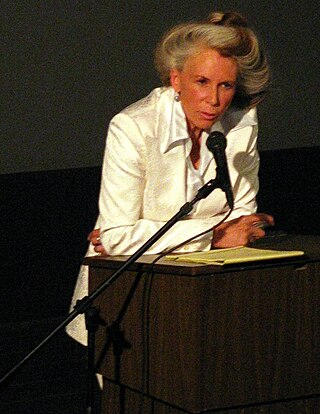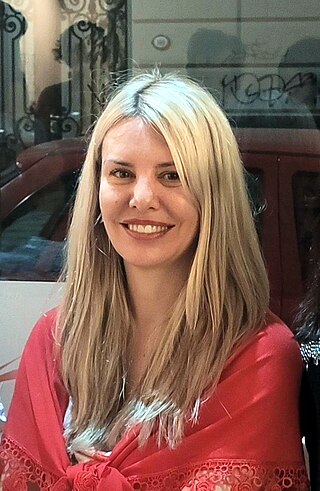Related Research Articles

Catharine Alice MacKinnon is an American feminist legal scholar, activist, and author. She is the Elizabeth A. Long Professor of Law at the University of Michigan Law School, where she has been tenured since 1990, and the James Barr Ames Visiting Professor of Law at Harvard Law School. From 2008 to 2012, she was the special gender adviser to the Prosecutor of the International Criminal Court.
Maria Robsahm is a Swedish politician who was a Member of the European Parliament from 2004 to 2009. She was elected as a member of the Liberal People's Party, part of the Alliance of Liberals and Democrats for Europe. However, she defected to Feminist Initiative on 1 March 2006.

Feminist Initiative is a radical feminist political party in Sweden. The party was formed in 2005 from a pressure group of the same name, and has since taken part in every election to the Riksdag and the European Parliament. The party won its first elected representative in 2014, with Soraya Post taking one seat in the European Parliament.

Sex trafficking is human trafficking for the purpose of sexual exploitation. It has been called a form of modern slavery because of the way victims are forced into sexual acts non-consensually, in a form of sexual slavery. Perpetrators of the crime are called sex traffickers or pimps—people who manipulate victims to engage in various forms of commercial sex with paying customers. Sex traffickers use force, fraud, and coercion as they recruit, transport, and provide their victims as prostitutes. Sometimes victims are brought into a situation of dependency on their trafficker(s), financially or emotionally. Every aspect of sex trafficking is considered a crime, from acquisition to transportation and exploitation of victims. This includes any sexual exploitation of adults or minors, including child sex tourism (CST) and domestic minor sex trafficking (DMST).
Janice G. Raymond is an American lesbian radical feminist and professor emerita of women's studies and medical ethics at the University of Massachusetts Amherst. She is known for her work against violence, sexual exploitation, and medical abuse of women, and for her controversial work denouncing transsexuality.
The Coalition Against Trafficking in Women (CATW) is a radical feminist and gender-critical non-governmental organization opposing human trafficking, prostitution, and other forms of commercial sex. It has been described as a "neo-abolitionist lobby group" that represents a "carceral feminist anti-trafficking practice," and has been criticized for essentializing women and promoting a controversial and "ideologically charged" definition of trafficking. It is strongly opposed to the perspectives of the Global Alliance Against Traffic in Women and the sex workers rights movement. It has been linked to anti-trans groups and its Latin American regional branch is a signatory of the manifesto of far-right anti-trans group Women's Declaration International.
Dorchen A. Leidholdt is an activist and leader in the feminist movement against violence against women. Since the mid-1970s, she has counseled and advocated for rape victims, organized against "the media's promotion of violence against women", served on the legal team for the plaintiff in a precedent-setting sexual harassment case, founded an international non-governmental organization fighting prostitution and trafficking in women and children, directed the nation's largest legal services program for victims of domestic violence, advocated for the enactment and implementation of laws that further the rights of abused women, and represented hundreds of women victimized by intimate partner violence, human trafficking, sexual assault, the threat of honor killing, female genital mutilation, forced and child marriage, and the internet bride trade.
The laws on prostitution in Sweden make it illegal to buy sex, but not to sell the use of one's own body for such services. Procuring and operating a brothel remain illegal. The criminalisation of the purchase of sex, but not the selling of one's own body for sex, was unique when first enacted in Sweden in 1999. Since then, this "Nordic model" for sex trade legislation has been adopted in several other nations.
Laura María Agustín is an anthropologist who studies illegal migration, informal labor markets, trafficking, and the sex industry. Blogging and speaking publicly as the Naked Anthropologist, she is critical of the conflation of the terms "human trafficking" and "prostitution". She argues that what she calls the "rescue industry" often ascribes victim status to people who have made conscious and rational decisions to migrate knowing they will be selling sex, and who do not consider themselves to be victims. She states that such views on prostitution originate in what she calls "fundamentalist feminism". She advocates for a cultural study of commercial sex, a theoretical framework she created in the journal Sexualities in 2005.

Human trafficking is the trade of humans for the purpose of forced labour, sexual slavery, or commercial sexual exploitation.
Fredrik Liljegren, also known as Fredrik Liliegren, is a Swedish programmer and businessman. He has worked at RedJade and co-founded the studio Digital Illusions and the demogroup The Silents.
Yvonne Svanström,, is an associate professor and head of the Department of Economic History at Stockholm University.

Hen is a gender-neutral personal pronoun in Swedish intended as an alternative to the gender-specific hon ("she") and han ("he"). It can be used when the gender of a person is not known or when it is not desirable to specify them as either a "she" or "he". The word was first proposed in 1966, and again in 1994, with reference to the Finnish hän, a personal pronoun that is gender-neutral, since Finnish does not have grammatical genders. However, it did not receive widespread recognition until around 2010, when it began to be used in some books, magazines and newspapers, and provoked media debates and controversy over feminism, wokeness, gender neutrality, and parenting. In July 2014, it was announced that hen would be included in Svenska Akademiens ordlista, the official spelling dictionary of the Swedish Academy. In April 2015, the gender neutral pronoun hen and 13,000 other new words were added in a new official dictionary of the Swedish language. Today, some believe the word has lost some of its feminist-activist connotation in Sweden as it is used in the media, court rulings and books.

Natasha Falle is a Canadian professor at Humber College in Toronto, Ontario, Canada, who was forcibly prostituted from the ages of 15 to 27 and now opposes prostitution in Canada. Falle grew up in a middle-class home and, when her parents divorced, her new single-parent home became unsafe, and Falle ran away from home. At the age of 15, Falle became involved in the sex industry in Calgary, Alberta.

Kajsa Ekis Ekman is a Swedish author, freelance journalist and debater. Her works have sparked debate in subjects regarding transgender issues, prostitution, surrogacy, and capitalism. She identifies as a left-wing radical feminist and has written a book and several articles from a gender-critical perspective, leading to accusations of being trans-exclusionary and event cancellations. She participated in the Swedish launch of Women's Declaration International. Until 2022 she wrote for Dagens ETC, but she was let go amid controversy in 2022. Later in 2022 she was hired as editor of Arbetaren, but let go shortly afterwards, which generated extensive debate. She received the Lenin Award in 2020.
Feminism in Sweden is a significant social and political influence within Swedish society. Swedish political parties across the political spectrum commit to gender-based policies in their public political manifestos. The Swedish government assesses all policy according to the tenets of gender mainstreaming. Women in Sweden are 45% of the political representatives in the Swedish Parliament. Women make up 43% of representatives in local legislatures as of 2014. In addition, in 2014, newly sworn in Foreign Minister Margot Wallström announced a feminist foreign policy.

Martin Anders Kinnunen, is a Swedish-Finnish member of parliament for the Sweden Democrats party. He was previously the press secretary for the party, as well as leader for the party's youth organisation the Sweden Democratic Youth (SDU) between 2005 and 2007. He took over that position from Jimmie Åkesson and was succeeded by Erik Almqvist.

The Nordic Criminal Model approach to sex work, also marketed as the end demand, equality model, neo-abolitionism, Nordic and Swedish model, is an approach to sex work that criminalises clients, third parties and many ways sex workers operate. This approach to criminalising sex work was developed in Sweden in 1999 on the debated radical feminist position that all sex work is sexual servitude and no person can consent to engage in commercial sexual services. The main objective of the model is to abolish the sex industry by punishing the purchase of sexual services. The model was also originally developed to make working in the sex industry more difficult, as Ann Martin said when asked about their role in developing the model - "I think of course the law has negative consequences for women in prostitution but that's also some of the effect that we want to achieve with the law... It shouldn't be as easy as it was before to go out and sell sex."

Feminist perspectives on sex markets vary widely, depending on the type of feminism being applied. The sex market is defined as the system of supply and demand which is generated by the existence of sex work as a commodity. The sex market can further be segregated into the direct sex market, which mainly applies to prostitution, and the indirect sex market, which applies to sexual businesses which provide services such as lap dancing. The final component of the sex market lies in the production and selling of pornography. With the distinctions between feminist perspectives, there are many documented instances from feminist authors of both explicit and implied feminist standpoints that provide coverage on the sex market in regards to both "autonomous" and "non-autonomous" sex trades. The quotations are added since some feminist ideologies believe the commodification of women's bodies is never autonomous and therefore subversive or misleading by terminology.
References
- 1 2 Hasiuk, Mark (7 March 2011). "Feminist lawyer outlines Swedish prostitution success". Vancouver Courier . Archived from the original on 2 April 2015. Retrieved 1 April 2015.
- ↑ Rothstein, Bo (16 October 2005). "En moralisk kollaps för svensk journalistik". Dagens Nyheter .[ permanent dead link ]
- ↑ Bondesson, Mikael (24 May 2005). "Jämställdhetsexperts advokattitel ifrågasatt". Dagens Nyheter . Archived from the original on 5 December 2010. Retrieved 22 February 2011.
- ↑ Bondesson, Mikael; Folcker, Annika (25 May 2005). "Orback har fortsatt förtroende för Ekberg". Dagens Nyheter .[ permanent dead link ]
- ↑ Wase, Dick (23 February 2009). "Bevare oss för statens "prostitutionsexperter"". Newsmill . Archived from the original on 28 July 2011.
- ↑ Kulish, Nicholas (5 October 2007). "Bulgaria moves away from legalizing prostitution". The New York Times .
- ↑ Barclay, Paul (presenter) (29 January 2008). "Raelene Frances, selling sex". Perspective. ABC Radio National (Australian Broadcasting Corporation).